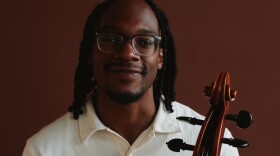We all wish we had better powers of recollection. We have all experienced the momentary panic of forgetting where we dropped our keys or reading glasses, or having a thought – a word or a name or a concept - just out of reach.
"My ability to keep everything in the forefront of my mind, as it were, to have it accessible so I could use it... that's a very limited capacity, and that's what we call working memory."
But what if something could make you remember something your mind had already forgotten? Researchers were able to do just that in a recent experiment documented in a new study called, "Reactivation of Latent Working Memories with Transcranial Magnetic Stimulation." Brad Postle is the senior author of the study, and a professor of psychology and psychiatry at UW-Madison.
The study focused on working memory, instead of long-term memories, which Postle explains as "networks of connections between neurons where the connections at synapses have been sculpted in an exquisitely precise way to encode the information that we will later retrieve and think of as a memory."
"Long-term memory, as far as we know, has an infinite storage capacity. It has never been discovered that someone literally had so much information in their memory that they couldn't fit one more thing. I don't think that can happen. Working memory, on the other hand, has a very constrained capacity," he says.
"My ability to keep everything in the forefront of my mind, as it were, to have it accessible so I could use it... that's a very limited capacity, and that's what we call working memory," Postle continues.
"One recent development with neuroimaging studies is that there are what we call 'information-based analysis techniques' that in effect let us read your mind... in a primitive sense."
To examine how our working memories store and dispose of information, Postle and his team scanned the brains of the participants. "One recent development with neuroimaging studies is that there are what we call 'information-based analysis techniques' that in effect let us read your mind, read your brain, in a primitive sense," he says.
By using different kinds of information, in this case pictures of faces, words and images of moving dots, Postle and his team were able to pinpoint the different parts of the brain that were activated while receiving each item. Participants in the study were given two items to remember, and were told they would be definitely quizzed on one item, with a 50/50 chance of being tested on the second.
"The interesting thing to us is that in this situation where you have two items in memory, but you know that only one of them is going to be tested within the next few seconds. The evidence of an active representation of the unprioritized item... disappears," says Postle. "So it's as though you forgot about it even though if a few seconds later we say, 'Okay now get ready for a test about item number two,' we can see in your brain activity it pops right back up into an active state."
"This experiment, in a way, I think is getting us closer to those really deep questions about what gives rise to this incredible experience that is what makes us human."
In their experiment, the researchers were able to recreate this, by physically restoring the memory to their subject's mind. "The pulse of TMS, of transcranial magnetic stimulation, had the effect of briefly bringing back an active trace of that unattended memory item," he explains.
Postle says this study is a step toward explaining consciousness, something he has been interested in for a long time.
"When you think about it, if I'm studying how do remember a face vs. a word, part of what I'm doing is studying what the subject is holding in her conscious awareness during those couple of seconds that I'm asking her to remember a particular face," he says. "This experiment, in a way, I think is getting us closer to those really deep questions about what gives rise to this incredible experience that is what makes us human."
*Originally aired December 2016






